Over the past year, around 87 million Chinese tourists have flown abroad. This positive tourism outlook is courtesy of the lifted travel restrictions after the worldwide pandemic.
Today, Chinese luxury travelers are among the most enthusiastic sectors driving growth in the global hospitality industry. With many of them seeking premium and personalized experiences, it’s a chance for foreign hotel businesses to tap into the demand while the “revenge travel” trend is still ongoing.
In this post, we’ll share insights on how hotel marketing in China works and the strategies hospitality establishments can execute to attract more Chinese tourists.
Who are Chinese Luxury Travelers?
Chinese people keen to travel abroad and seek luxury hotels are often classified as Gen Z travel retail shoppers with stable annual incomes. The growing number of these younger consumers covers approximately 30% of new travelers in the local market.
Meanwhile, Ultra-High Net-Worth Individuals (UHNWIs) and their families also recorded an increase in overseas trips in 2023. In addition to staying in luxury hotels, many of these wealthy customers are visiting Asia Pacific countries for premium medical and wellness services.
These Chinese millionaires typically equate high-end travel experiences to buying luxury goods. They believe that upper-middle-class destinations expose their children to “white elite” privileges.
Another crucial demographic worth looking into is solo travelers. In a report from Mafengwo, data showed that customers under the younger age category tend to travel more independently than older generations. With this consumer group ready to splurge money, it’s wise to create special accommodation packages that suit their needs.
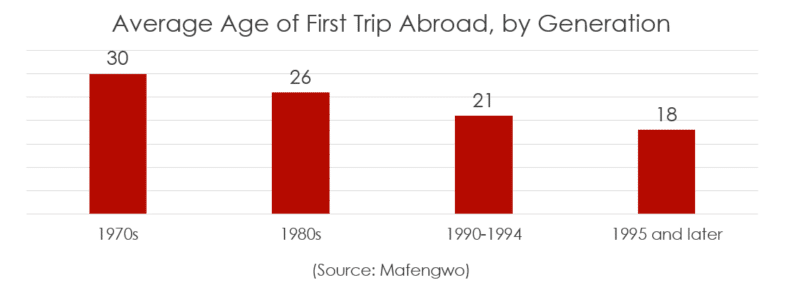
What are Chinese Luxury Travelers Looking for?
Luxury travelers from China pay great attention to details and possess a discerning taste. They seek highly cultural experiences from the places they visit. When they book luxury hotels, these consumers expect the full package, from food and beverages to amenities and tours.
High-quality service, a positive online reputation, and overall value are a priority for them during overseas trips. Here are more specific preferences you should take note of:
- Ease and efficiency of online services during their trip
- High access to cultural establishments, including restaurants and local landmarks
- Luxury hotels that offer exceptional comfort and service regardless of value
- Participation in wellness travel activities, like eco-tourism

Passengers coming and going at Beijing Daxing International Airport (Source: China Daily)
Top Platforms for Hotel Marketing in China
1. Little Red Book (Xiaohongshu)
If you want an effective digital marketing strategy to lure Chinese tourists, Xiaohongshu is an app you can’t skip. The platform’s focus on word-of-mouth marketing gives brands a chance to build a positive reputation organically.
It’s among various domestic social network channels that thrive in user-generated content and community-driven engagements. Because of this, it’s worth noting that users on this platform prefer content that feels genuine and personal.
Through an official account in this app, brands can create corporate social profiles to share advertisements for your hotel’s services, events, videos, and collaborations with key opinion leaders. These posts allow you to build a polished and professional brand image in the Chinese market.
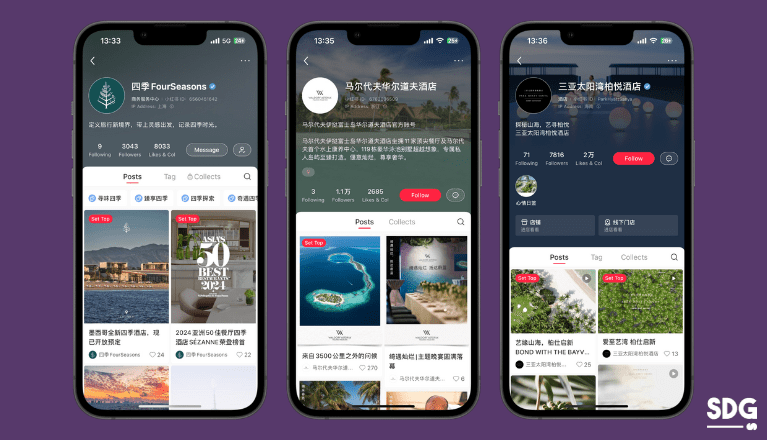
Luxury hotels on Xiaohongshu
2. Ctrip & Ctrip WeChat Mini-app
Ctrip (commonly known as Trip.com) holds the largest market share among online booking platforms in China. It offers a direct channel for Chinese tourists to book the travel services they need, whether for an overseas or domestic trip.
In an attempt to capture the platform’s 67 million active users, many hotels run customized promotional campaigns on Ctrip to target specific consumer groups or interests. They can include special promotions, holiday packages, or themed stays that appeal to local customers.
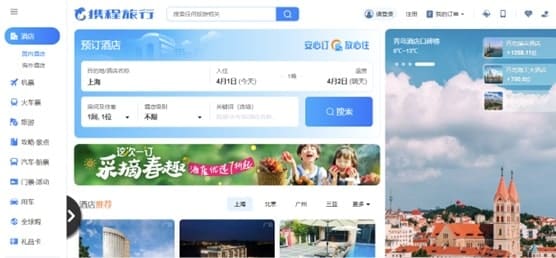
Ctrip’s Website Homepage
By integrating Ctrip’s loyalty programs into your business, you can offer special rates or perks exclusive to the platform’s users to encourage direct bookings. The platform also provides valuable data on customer preferences and travel patterns, allowing hotels to tailor their offerings and promotional strategies more effectively.
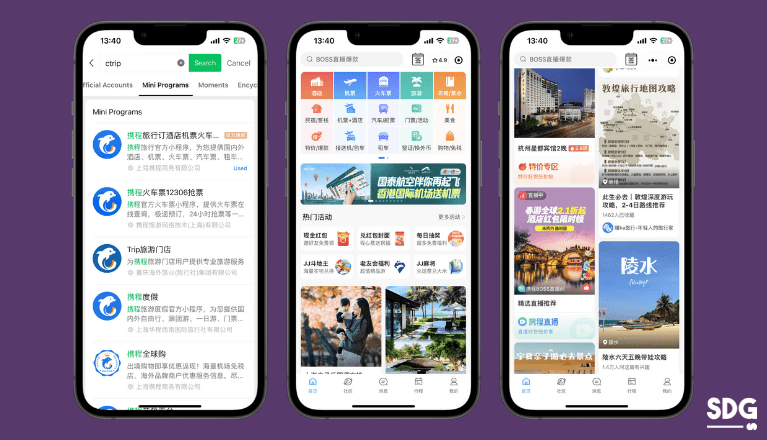
Ctrip’s WeChat Mini Program
Ctrip also provides another source of traffic for businesses through their dedicated Mini-Program. This mini-application opens one-on-one real-time communication between hotels and potential guests. It enables personalized customer service and immediate response to inquiries that regular Chinese consumers expect from brands.
Marketers can also encourage guests to share their experiences and reviews directly through this Mini-Program, which they can utilize as social proof to attract more bookings from the local market.
3. WeChat & WeChat Channels
Over 82% of Chinese internet users are active on WeChat, so chances are your target market is already using this app. On top of that, this platform thrives in a one-on-one communication model, making it capable of creating an exclusive consumer journey specifically for luxury-loving audiences.
As China’s biggest super app, it provides various social media features to showcase your hotel services. One of the tools you can consider is Channels, a video feed that allows users to post short videos, live streams, and picture slideshows.
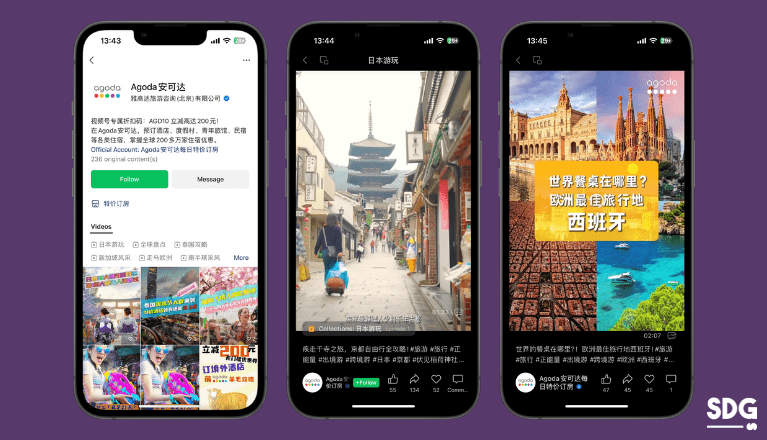
Agoda’s WeChat Channels
The large scale of traffic coming from WeChat Channels presents a golden opportunity for brands to increase their exposure and connect with target groups through high-quality content that highlights the unique offerings of their hotels.
You should also ensure this feature seamlessly integrates with other parts of WeChat’s ecosystem, such as your e-commerce store or mini-programs.
4. Qunar
While not as popular as Ctrip, Qunar accommodates over 28 million monthly active users. This online book platform offers services to connect Chinese tourists to 700,000 global airlines, 2.59 million hotels, and 56,000 cultural landmarks.
Like other OTAs, marketers can create detailed listings on Qunar, including information about the hotel’s amenities, services, and nearby attractions.
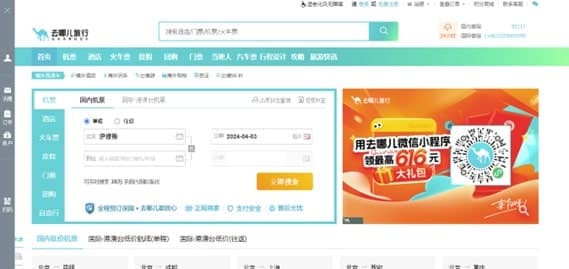
Qunar Website Homepage
How to market luxury hotels in the Chinese Market
● Create a strong brand presence on LRB & WeChat using video marketing
Gone are the days when Chinese tourists relied solely on recommendations from Online Travel Agencies (OTA). With modern travelers getting younger and more tech-savvy, they’re looking at external sources like Little Red Book and WeChat to plan their next travel destination.
In 2022, the Xiaohongshu searches for travel-related terms like “glamping” saw a staggering 746% increase. Beyond that, around 550,000 notes are created for the word “camping.” These insights clearly show that local consumers are leveraging social media channels to share their experiences and search for a destination.
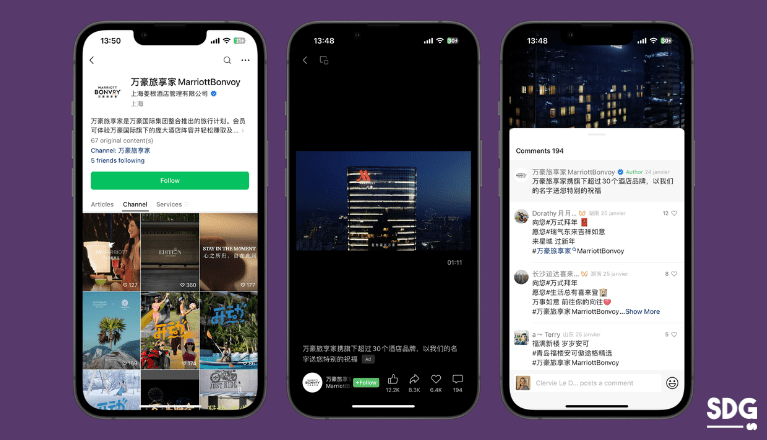
Marriot Hotels’ Video Advertisement in WeChat
Videos posted on social networking sites are particularly popular in the hospitality industry. For example, Marriot Hotels launched a video ad for the Chinese New Year. It features all 30 of the company’s hotel establishments.
It also highlights the spirit of the national holiday. As a result, this specific content garnered over 12,000 likes, 6,000 hearts, and 8,000 shares.
● Localize your hotel’s website to increase brand credibility in China
Hotel websites serve as the window to your business, especially for Chinese tourists who haven’t heard or seen what your brand can offer. It’s also an essential tool for building trust and maintaining a positive online reputation in the local market.
As you may already know, local search engines in China work differently from the West. If you want to be visible on platforms like Baidu, you must localize your website with content written in Simplified Chinese.
For optimal results, you must also host your website within China. Ensure it contains essential information, easy booking options, a chat feature for immediate inquiries, and direct links or QR codes to your social media profiles.
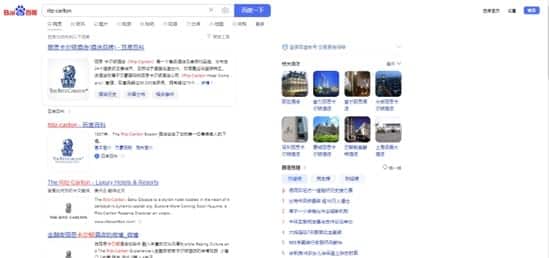
Ritz-Carlton Search Result on Baidu
Content marketing platforms and forums are also highly favored in Baidu SEO. Brands can personally participate and post on these channels to ensure the hotel is represented correctly online. Such efforts reinforce your reputation and trustworthiness among Chinese tourists.
● Launch Influencer Collaborations for better visibility
In China, influencers are often referred to as Key Opinion Leaders (KOLs). They command attention with their online presence and connect with their audiences through posting content on different platforms.
These online personalities have loyal followers who not only watch and engage with their content but also share it. Because of this influence, they have the power to bring your hotel closer to local consumers.
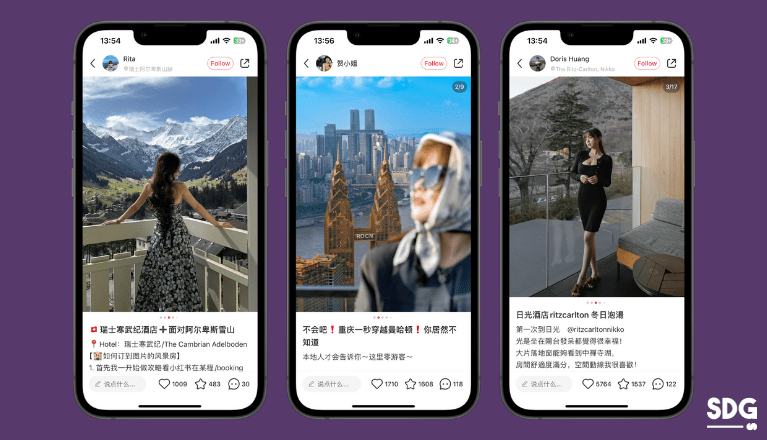
Travel KOLs on Little Red Book promoting global hotels
The key to a successful influencer collaboration is selecting a KOL whose image and values align closely with your brand. Ensure that their audience is likely to be interested in what you offer.
It’s a common misconception that partnering with the most popular KOLs, those with millions of followers, guarantees success. In reality, a misalignment in audience demographics can result in wasted investment with little to no return.
● Promote social media channels to Chinese hotel clients for referrals and reviews
User-generated content has a significant influence on China’s hospitality market. Reviews, testimonials, photos, and videos created by users ultimately shape the preferences and decision-making of your target audiences.
This content type is incredibly impactful among younger generations who value authenticity and peer recommendations over traditional advertising.
By promoting your local social channels, you can encourage guests to share their experiences through trendy challenges or by posting photos and reviews to enhance a hotel’s visibility and local appeal. These digitalized experiences can also be a source of future customer referrals.
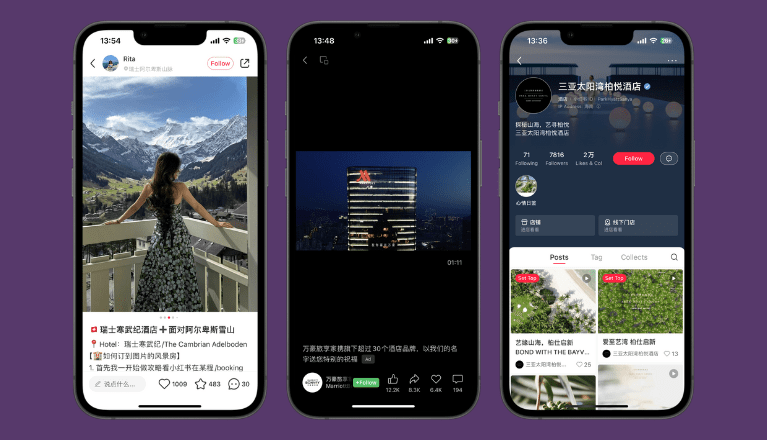
● Utilize Live Streams & Virtual Tours for one-on-one consumer engagement
Marketing luxury hotels in China requires innovative strategies that cater to the unique preferences of wealthy locals. One powerful approach is to use live streams and virtual tours, which allow for immersive, one-on-one consumer engagement.
This method taps into the personalized and customized experiences that today’s travelers seek while utilizing technological advancements to your brand’s advantage.

Image by Freepik
The shift towards virtual experiences was notably accelerated by the COVID-19 pandemic. It spurred the creation of interactive websites and virtual tours to keep tourism industries alive. Countries like Greece and Italy have seen success with these initiatives.
● Connect with Chinese OTAs for direct bookings and local brand recognition
While it’s true that modern tourists are becoming more reliant on social media for recommendations on their next trips, Chinese OTAs are still influential platforms in China.
In fact, a June 2023 survey from Rakuten revealed that 44% of respondents used OTAs for trip planning. With over 509 million users, partnering with these platforms is a strategic move that can enhance direct bookings and local brand recognition.
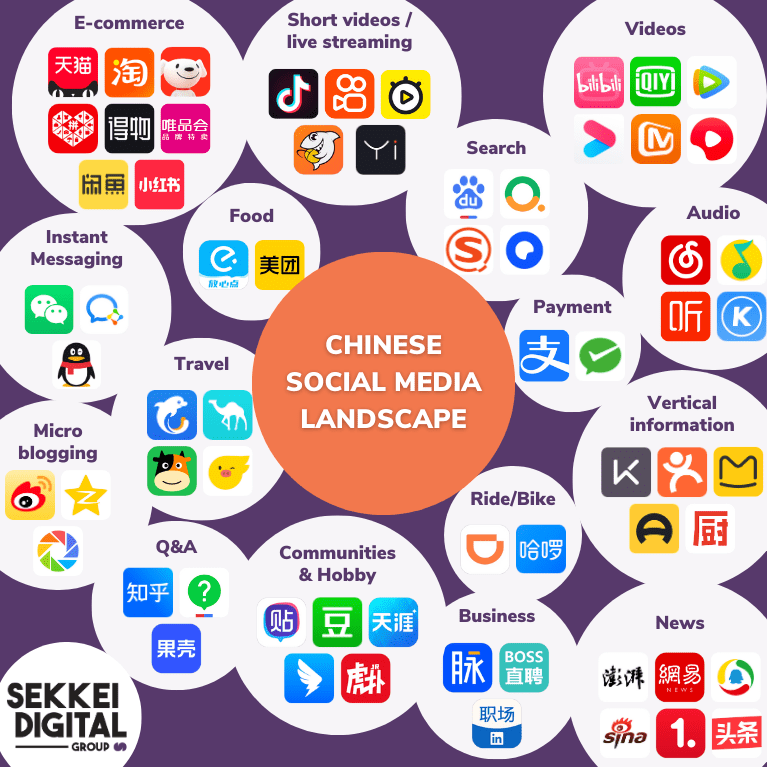
● Allow local Mobile Payment Options for improved on-site customer experience
Local mobile payment options are pivotal for enhancing the on-site customer experience, especially with younger tourists. The adoption of e-wallets in China has transformed the country into a cashless society, with platforms like Alipay and WeChat Pay leading the market.
A notable example of the successful integration of these payment methods in overseas establishments is Luxe Hotels. It was actually the first hotel property in Los Angeles and Beverly Hills to accept Alipay and WeChat Pay. This strategy aimed to cater to the growing number of Chinese tourists visiting these cities.
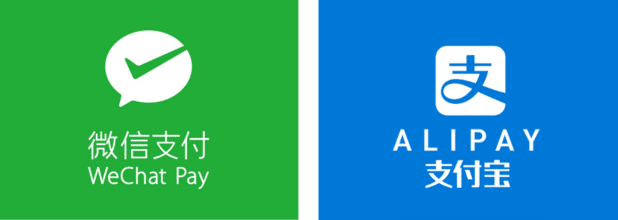
Quick Q&A
Where do Chinese tourists travel the most?
In recent years, Thailand has consistently emerged as a favorite destination among tourists from China. There was a notable surge in interest in 2024, with bookings soaring by 101%. Meanwhile, the appeal of Southeast Asian countries also grew, with Singapore, Malaysia, Cambodia, and Indonesia experiencing dramatic increases in bookings.
Ready To Dominate The Chinese Luxury Market? Get In Touch With Us Today!
The rapid growth of outbound tourism in China in 2024 compared to the previous year indicates the upcoming surge of Chinese customers for foreign luxury hotels. While it’s a positive outlook, businesses must prepare accordingly to capture the interest of local consumers properly.
At Sekkei Digital Group, we understand the trends and preferences of the Chinese consumer market. With our extensive experience in promoting different brands in China, we can guide your business to gain a formidable brand position in the local market.
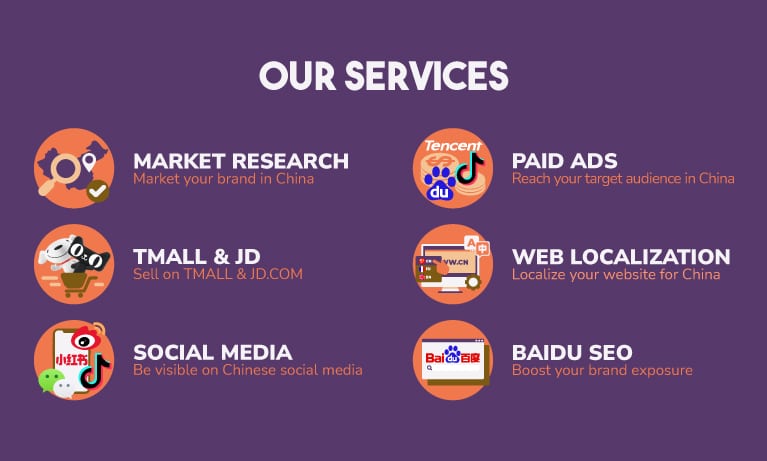
Whether it’s launching social media campaigns, opening official accounts, or finding a travel KOL, we have the best digital solutions for you. Contact us today, and let’s start working together!
References:
The affluent Chinese tourist post-pandemic: What’s changed and how is luxury hospitality adapting?
What does the growth of Little Red Book mean for post-pandemic China?
Travellers from China: Marketing to Chinese tourists
PREPARING FOR THE RETURN OF BIG-SPENDING CHINESE TRAVELERS


